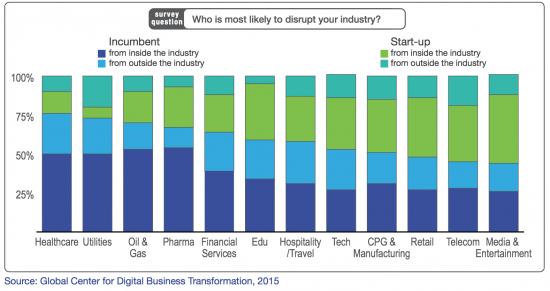































The ancient Roman poet Virgil might feel at home in the Digital Age (once the initial future shock wears off!). He famously said, "Fortune favors the bold." These words have never been more prescient.
In a recent article, we likened the current climate of ever-present disruption, innovation, and change to a Digital Vortex, in which ideas and technologies constantly break apart and recombine - often into highly disruptive and sometimes unexpected new business models (Apple, Amazon, Tesla, and Fortune magazine's list of unicorns have benefited from this phenomena).
In the Digital Vortex, bold innovation and gutsy, disruptive new business models are a necessity. That is, if you want your company to be a disruptor rather than disrupted.
By their very nature, startups exemplify this bold approach. They are smaller, more agile, able to experiment, innovate and execute faster, and recover from minor missteps more quickly. Above all, they aredigital.
Incumbents can cite their own competitive advantages including access to capital, large customer bases, and brand recognition. However, in the Digital Age, these advantages are not as significant as they once were. In fact, they can even be adisadvantage,encumbering established companies from taking the bold risks and innovative steps necessary to remain competitive.
Today, incumbents can be constrained by, among other things, doing things the way they've always been done, meeting shareholder expectations, and managing cost structures. Moreover, highly digitized startups can chip away at incumbent advantages faster than ever before by employing the techniques I outlined in my blog titled, "Can Corporations Complete with Unicorns?"
Snapchat, a unicorn in the mobile video messaging space, is an example of what's possible. The startup is said to have upwards of 200 million active monthly users, and a market value in excess of$16 billion.
In our Digital Vortex survey, many incumbents believed that disruption would come from traditional competitors within their own industries. This was especially true in industries such as utilities and pharma (see left half of chart below), which have so far been relatively unscathed by significant digital disruption. I believe that instead of resting easy, these companies should take a cautionary lesson from businesses in retail, telecom, and media. In each of these industries, seismic disruption arose from outside firms that seemingly came from nowhere.
Did Motorola, Nokia, and BlackBerry really expect trouble from, of all things, a computer maker named Apple or a search company called Google?
Incumbents must be aware of startups and industry "outsiders"
 Click to Enlarge
Click to EnlargeTo compete in the Digital Vortex, incumbents must bebold- bold thinkers, bold innovators, and bold competitors.
To gain the kind of agility and fast innovation that startups enjoy, however, incumbents also need to drive their own digital business transformation. This means building a digital foundation with core capabilities such as predictive analytics, dynamic processes, mobility, and fast collaboration.
This technology foundation will enable rapid innovation, driving incumbents to create - and continue to create - the bold new business models that will keep them competitive for years to come, along with the agility that will enable them to respond to new threats as they arise.
When being bold, it's not about what you don't know, but rather challenging what you believe to be true, that's most important.
 Tags quentes :
Internet of Everything (IOE)
IoE
Transformação Digital
digital disruption
digital business
Joseph Bradley
digital vortex
IMD
DBTCenter
Tags quentes :
Internet of Everything (IOE)
IoE
Transformação Digital
digital disruption
digital business
Joseph Bradley
digital vortex
IMD
DBTCenter